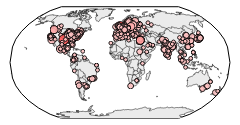Evolutionary Classification of Protein Domains
Browse ECOD AF2/PDB combined classification as a tree or download distributable files. This classification currently includes both experimental structures and predicted models.
(2024/14/09) -- If you are looking for the original PDB-only ECOD (versions up to 291), that can still be found here
Search by keyword
Search by UniProt/PDB accession:
Search by protein sequence using BLAST
ECOD is a hierarchical classification of protein domains according to their evolutionary relationships. This database contains our combined classification of structure predictions from 48 proteomes from AlphaFold Database with experimental structures from the Protein Data Bank. Previous versions of ECOD that solely classified the PDB are available here. Addtionally, published classifications of human, Vibrio parahaemolyticus, Salmonella enterica typhi and the original 48 proteomes are available.
Please cite the following references:
R. D. Schaeffer, K. E. Medvedev, et. al. (2024) ECOD: Integrating classifications of protein domains from experimental and predicted structures. NAR Submitted
R. D. Schaeffer, Y. Liao, H. Cheng, N. V. Grishin. (2017) ECOD: new developments in the evolutionary classification of domains. Nucleic Acids Res. 45(D1): D296-D302.
H. Cheng, R. D. Schaeffer, Y. Liao, L. N. Kinch, J. Pei, S. Shi, B. H. Kim, N. V. Grishin. (2014) ECOD: An evolutionary classification of protein domains. PLoS Comput Biol 10(12): e1003926.
| ECOD statistics | |
|---|---|
| 410,427 | Predicted structures |
| 201,228 | Experimental structures |
| 718,390 | Experimental proteins/chains |
| 1,816,770 | Domains |
| 2,457 | X-groups |
| 3,716 | H-groups |
| 3,950 | T-groups |
| 16,299 | F-groups |

Feel free to email us if you have any questions or suggestions.
Note: It seems that your browser does not have Javascript enabled.
We use JavaScript to organize the database in tree-view style. Our Javascript bits are completely safe and will NOT harm you computer. To make the online database fully functional, please enable JavaScript and reload the page.